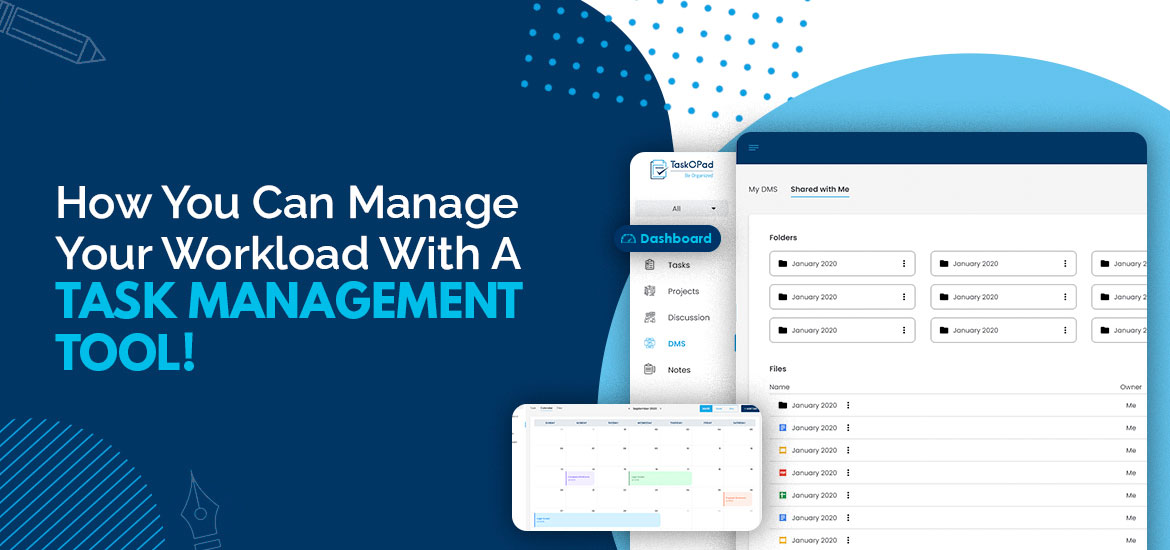
Workload Management
Top Workload Management Tips For Managers
Jul 26th, 2025
Workload management is essential for meeting deadlines while maintaining the high efficiency of employees. As a systematic process of managing the workflow accurately & project managers distribute work to team members and monitor their work routine.
This monitoring enables managers to utilize the skills of available resources effectively that assists them and identify any loopholes and make adjustments. Though task management software can help you manage workload efficiently & here we share some useful tips that will make your life easier.
As a project manager, you need to ensure that the assigned work has been completed and delivered on time. You should maintain a subtle balance between the number of tasks and the abilities of your team members to accomplish all the assignments on time & maintain the optimum productivity level. But then, managing all the aspects at once itself is a herculean task & therefore, workload management comes into the picture.
Poor resource allocation, inaccurate estimation of deadlines, the underperformance of the team & work-related inadequacy at an individual level can create an imbalance in workload management. If you want to implement proper management at the workplace, these aspects need proper attention.
Key factors that contribute to proper workload management
- Delegate tasks as per the employee’s skills and overall performance
- Compare actual workload and estimated workload as per the project
- Identify processes necessary to be accomplished for ongoing projects
A team task management tool can help you delegate tasks effectively as per the employee’s capabilities, and you can easily identify necessary processes. These factors are important to manage workload systematically.
While talking about the obstacles of workload management, we need to keep in mind that it is a complex, ongoing process & Project managers have to identify the root cause of an issue whenever it surfaces at the departmental level while managing workload. These days, modern industries keep on changing their nature and business model to stay relevant to ever-changing market trends. Therefore, workload management software should also remain flexible.
Also Read – Your Handy Guide to Create the Good Work Plan (GWP) for Agile Teams
Leveraging Technology for Modern Workload Management
Gone are the days when “task management software” was a niche tool. Today, sophisticated Workload Management Platforms and Project Management Tools are indispensable. These platforms offer advanced functionalities beyond simple task tracking:
- Real-time Visibility: Gain a comprehensive, real-time overview of individual and team workloads, project statuses, and resource availability.
- Dynamic Resource Allocation: Adjust assignments on the fly based on changing priorities, employee availability, and skill requirements.
- Advanced Analytics and Reporting: Generate insightful reports on productivity, project performance, resource utilization, and potential bottlenecks. This data is crucial for continuous improvement and strategic decision-making.
- Integrated Communication: Facilitate seamless communication within tasks and projects, reducing information silos.
- Forecasting and Predictive Analytics: Some advanced tools can help predict future workload demands and identify potential resource shortages.
When selecting a tool, consider its flexibility, scalability, integration capabilities with existing systems, and user-friendliness for your team.
Also Read – How to Manage Team’s Workload Using a Task Management Tool
Obstacles Need to be Removed During Workload Management
The mismanagement in the plan is one of the major causes for delay in project completion. However, some delays are inevitable in particular circumstances. Underachievement and underperformance of any of your team members are one of such reasons. But, thanks to the increasing practice of defining accountability and other factors & these issues have not remained frequent in today’s business landscape. Managers need to cultivate specific traits and strategies to navigate these:
- Embrace Agility and Adaptability:
- Fluid Planning: Recognize that plans will evolve. Be prepared to pivot, re-prioritize, and reallocate resources as market conditions or project requirements shift.
- Iterative Approach: Adopt agile methodologies where possible, allowing for continuous adjustments and learning.
- Champion Transparent Communication:
- Open Dialogue: Foster an environment where team members feel comfortable discussing workload concerns, potential roadblocks, or the need for support.
- Clear Expectations: Ensure everyone understands their roles, responsibilities, and how their contributions align with overall project goals. Set SMART Communication Goals for your team members.
- Active Listening: Regularly check in with your team to gauge their well-being and identify early signs of stress or overload.
- Cultivate a Culture of Accountability and Support:
- Defined Ownership: Clearly define who is accountable for each task and outcome.
- Support Systems: Provide the necessary training, tools, and mentorship to help team members succeed. Don’t let underperformance fester; address it constructively with support.
- Psychological Safety: Create a safe space where mistakes are viewed as learning opportunities, and asking for help is encouraged.
- Prioritize Well-being and Recognition:
- Work-Life Balance: Actively promote and model healthy work-life boundaries. Overwork is not sustainable.
- Celebrate Successes: Acknowledge and celebrate both small wins and major achievements. This boosts morale and reinforces positive behaviors. Consider team events, recognition programs, or simple shout-outs.
Also Read – Must-Have Skills For A Team Manager
The Manager’s Evolving Role
Your role as a manager extends beyond just assigning tasks. You are a strategist, a coach, and a facilitator. Analyze your company’s operational systems and ensure they align with the broader vision. Your workload management efforts are directly contributing to the realization of that vision.
Cultivating a positive and supportive team culture is paramount. Regular stand-up meetings, open-door policies, and creating a sense of psychological safety contribute significantly to effective workload distribution. When team members feel comfortable, transparent, and empowered, they are more likely to proactively manage their own tasks and seek help when needed.
Concluding Lines
Though ideal workload management with a balanced approach is impossible to achieve & advanced features of robust task management software can help you manage things effectively. With this, you need to show adaptability, resilience, and tenacity as a project manager. All you can do is to put all effort into making your workplace productive & friendly for team members by resolving the major issues.
Consider exploring modern workload management solutions like TaskOPad. TaskOPad offers intuitive features for delegating tasks, monitoring progress, and gaining valuable insights into your team’s performance across various industry sectors. Whether you’re a startup or an established SME, TaskOPad can empower you to manage projects of every size with greater efficiency. You can try it out yourself with a 15-day free trial, or book a free demo to see how it fits your workflow.
Search by posts
Search by posts
Recent posts
7-25-2025
Office Management Software













